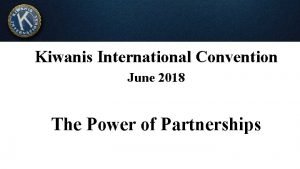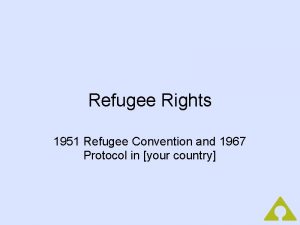International Law The 1951 Refugee Convention Australia is













- Slides: 13

International Law


The 1951 Refugee Convention • Australia is a signatory to the United Nations 1951 Convention relating to the Status of Refugees and to the subsequent 1967 protocol. • This means that Australia is legally obliged to develop law and policy in the spirit of The Refugee Convention.

What is the “spirit” of this convention? • Assist those fleeing from persecution – no penalties for those who arrive without documents. [Article 31] • The principle of non-refoulement (non-return) [Article 33]

Human Rights Treaties • International Covenant on Civil and Political Rights (ICCPR) • Convention Against Torture • The Convention on the Rights of the Child

Useful resource • https: //www. youtube. com/watch? v=PZvx 9 yg 5 Wlw

Domestic law • Law making in regard to migration is the responsibility of the Commonwealth Parliament. • The Migration Act (1958) • Although it is called The ‘Migration’ Act, it covers asylum seekers and refugees.

Migration Act 1958 • Asylum seekers who arrive on the mainland without a valid visa must be held in immigration or community detention, or transferred to an offshore processing facility. • Prior to 1992, asylum seekers were held in detention under the Migration Act 1958 (Cth) on a discretionary basis. Mandatory detention was introduced under the Migration Amendment Act 1992 (Cth).

Migration Amendment Act 1992 • Under this Act, it is mandatory for those who arrive without visas to be detained (i. e. kept in detention) • This Act also removed limitations on time spent in detention.

Why was this Act passed? It was proposed that mandatory detention would: • Facilitate the processing of refugee claims; • Prevent unlawful migration; and • Save the cost of re-locating people into the community

Has it worked? • Detention is expensive • Suffering of those in detention • Australia’s international reputation has been negatively impacted as we are not seen to be upholding our responsibilities in regard to international treaties

CLASH International Law Domestic Law

The enforcement problem • There is no effective means of enforcing Australia’s obligations at an international level. • As a result, it is left to Australian courts to monitor the legality of the government’s actions. • However, Australian courts can only enforce obligations under domestic law rather than international law. (The Conversation, 2014)
 1951 refugee convention
1951 refugee convention 1951 refugee convention
1951 refugee convention Equal remuneration convention 1951
Equal remuneration convention 1951 International congress and convention association
International congress and convention association Kiwanis international convention 2019
Kiwanis international convention 2019 Loop law sign convention
Loop law sign convention First law of thermodynamics sign convention
First law of thermodynamics sign convention Andre -marie ampere
Andre -marie ampere Kenapakah laporan fenn-wu 1951 diterbitkan
Kenapakah laporan fenn-wu 1951 diterbitkan Convenio sobre igualdad de remuneración, 1951
Convenio sobre igualdad de remuneración, 1951 Pemerkasaan pendidikan kearah kesepaduan sosial
Pemerkasaan pendidikan kearah kesepaduan sosial Sistem ahli sejarah tingkatan 4
Sistem ahli sejarah tingkatan 4 Primeira geração (1951-1959)
Primeira geração (1951-1959) Mischief rule advantages and disadvantages
Mischief rule advantages and disadvantages

























